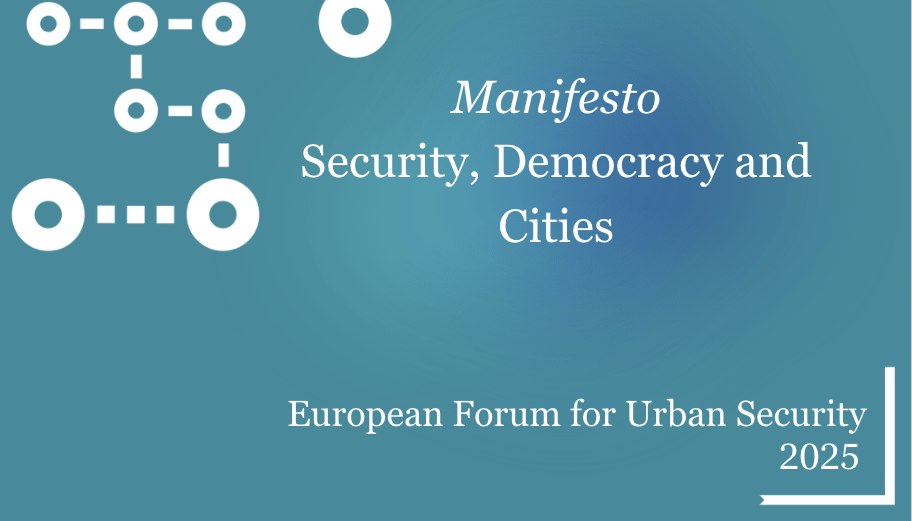February 2022 – Efus’ working group on the local roots and impact of organised crime, which is led by the Cities of Amsterdam and Rotterdam, started in February a series of web conferences to be held throughout the first semester of this year. The first one, on 9 February, focused on the European Union’s ‘administrative approach’ to track and stifle the use of legal means by organised crime groups to conduct their activities and launder money, and the experience of the City of Amsterdam in tackling organised crime.
The ‘administrative approach’
Representing Efus, Tatiana Morales, Programme Manager, stressed that on top of being “transnational, global and highly agile,” organised crime also represents “a real danger for local authorities and society.” How to combat and prevent it? Apart from law enforcement and penal law, local authorities can act to protect citizens “by combining social and other measures,” she said.
Chadia Dehbi, policy and practice officer at the European Network on the Administrative Approach (ENAA), presented this approach promoted by the EU at the national and local levels. Contrary to what the name might suggest, it’s not about doing more paperwork, but about using all the means available to local, regional and national governments to detect, prevent, counter and suppress the use of the legal infrastructure by organised crime, such as laundering money through real estate or local businesses.
The EU defines it as follows: “An administrative approach to serious and organised crime is a complementary way to prevent and tackle the misuse of the legal infrastructure through multi agency cooperation by sharing information and taking actions in order to set up barriers.”
Information and guidelines
As such, local authorities can, for example, screen applications for subsidies or requests for permits (for a real estate development, to set up a business…) through the administrative approach ‘lens’ and thus detect and prevent criminal organisations from accessing public funds or legalising criminal operations. Such an approach is already used by a number of local and regional authorities in Europe, in particular in Italy and the Netherlands.
Local and regional authorities can find guidelines and resources at the European Network on the Administrative Approach, which has a network of 27 local contact points in each Member State. It has published a practical handbook that is available (in all the EU’s languages) through their website, which also features practises, policy papers and guidelines.
Amsterdam: offering another path to young people
Robert Valkhoff, team manager at the Public Order and Safety department of the municipality of Amsterdam, explained how his city, a European hub for drug trafficking, is coping.
The city’s strategy is based on what they call ‘a triangle’ between the mayor, the head of prosecution and the head of police. Together, they discuss the joint strategy and coordinate interventions with five objectives in mind: raise awareness among recreational users; separately address the soft and hard drug markets; offer perspectives to vulnerable young people to prevent them from choosing a ‘career’ in drugs; combat corruption and undermine/subvert crime, and lastly combat excessive violence.
Over 20 projects carried out
So far, over 20 projects have been carried out in the framework of this strategy. One of them has proved particularly interesting: it seeks to offer young people deemed at risk of falling into drug trafficking a chance to set another life path. “It is based on the cooperation between the municipality, youth workers, police and the health department so that we can have an individual, case by case approach focused on these young people’s families,” explained Mr Valkhoff. In 2021, about 40 young people were involved.
Another example of this joint strategy is the targeting of people who are indispensable to the drug traffickers’ operations, such as craftsmen with specific skills. Such interventions require “close cooperation between the municipality, police, public prosecution and the tax office.” By focusing on these special roles within the organisation, Amsterdam authorities were able to find and arrest an individual who laundered money from “a house in the middle of nowhere” where police found “3,000 kilos of cocaine and 11 million euros in cash.”
There are, however, obstacles to this approach, including the difficulty of recruiting and retaining experienced police officers and the fact that “it requires a long-term approach, which can be distorted by political events and temporary budgets,” added Mr Valkhoff.
More web conferences to come
Efus’ working group on organised crime will hold four more web conferences in the weeks to come. The next one will be held on 16 March and will focus on the social use of organised crime’s confiscated assets in Italy.
> The European Network on the Administrative Approach (ENAA)
> Efus’ activities on the topic of the fight against organised crime
> Follow Efus’ working group on Efus Network (reserved for members)




